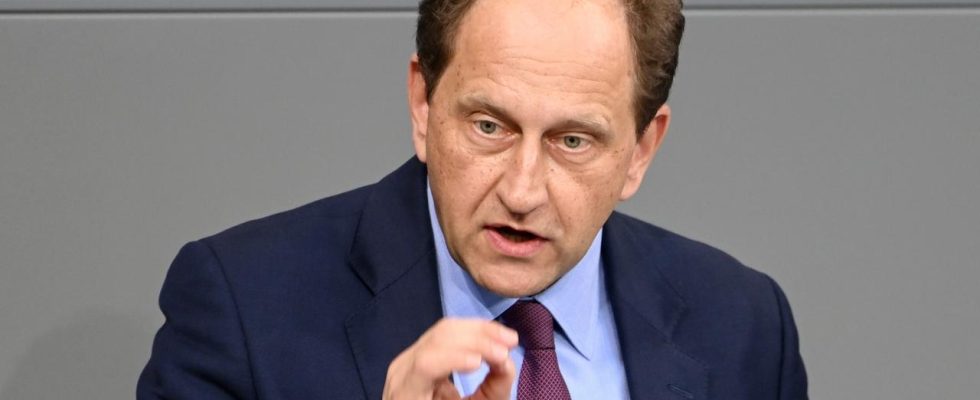It is currently one of the most difficult jobs in diplomacy: German ambassador in Moscow. The FPD politician Alexander Graf Lambsdorff will take up this post in the summer. Russia is not completely foreign to him.
A few months ago, Foreign Minister Annalena Baerbock asked FDP politician Alexander Graf Lambsdorff whether he could imagine becoming ambassador in Moscow. “I took a deep breath, because that’s a very difficult task foreseeable,” says Lambsdorff in an interview with the ARD capital studio. So he asked the minister for a weekend to think about it.
Should he really keep his distance – to his home in Bonn and Berlin? To active politics in the Bundestag? The 56-year-old quickly realized that he wanted it. Because he is pleased that he is trusted with the great task of keeping in touch with the Russian government in times of war in Europe. But also because for Lambsdorff – the trained diplomat – it closes personal circles. “I’m actually getting back to where I was.”
On the soccer field at minus 20 degrees
Diplomacy and Russia – for Lambsdorff, who comes from a German-Baltic aristocracy, it’s a long story. Some of his ancestors were in the Russian government service before the October Revolution. A distant relative by the name of Wladimir Lamsdorf, in a slightly different spelling, was even Russia’s foreign minister in the early 20th century.
For the FDP politician personally, the matter of diplomacy and Moscow started in a certain way 40 years ago: In the 1980s, as a teenager, he visited his father, who was then working at the German Embassy in Moscow. Later, Lambsdorff did his own diplomatic training. And in 1996 he ended up back in Russia – in Siberia – for language lessons.
There he plays in his free time for the “Club of Upright Fans of Football”. “A wonderful name for a football team,” Lambsdorff recalled. “We played the winter tournament there on a blanket of snow at minus 20 degrees. I’ve rarely had as much fun playing football as I did back then.” They are nostalgic memories of a better time. That’s when Lambsdorff developed his affection for the people in Russia, as he says.
Clear language, controversial debates
Nevertheless, for the time being he continues elsewhere, namely in politics. A political role model was his uncle Otto Graf Lambsdorff. And so it is of course the FDP as a party, for which Lambsdorff first goes to the European Parliament in Brussels and then to the Bundestag.
Lambsdorff distinguishes himself as a foreign politician, he likes clear language and controversial debates and is often invited to talk shows. Does he have to change after 20 years in politics if he becomes ambassador now? A bit, Lambsdorff believes: “Just throwing out your opinion if you think the opposition is doing something again that doesn’t make much sense or maybe a coalition partner, that’s obviously not going to work as a diplomat.”
For Lambsdorff, however, diplomacy does not mean keeping your mouth shut. He has long criticized Vladimir Putin’s policies. This is exactly what he will continue to do when he represents the German position as ambassador in Moscow. He reiterates that he likes Russian culture and the country, adding: “But that doesn’t change the fact that the judgment on politics has to be sober and factual. And the sober and factual judgment at the moment can of course not be positive.”
Don’t abuse the term diplomacy
Lambsdorff is clearly distancing himself from those who are calling for a quick deal with Russia, possibly at the expense of Ukraine, just to end the fighting. Because that’s not diplomacy. “Then the term is misused and does not mean a negotiation on an equal footing, but the surrender of one side in favor of the other.”
His task in Moscow will be to maintain a certain degree of contact with the Russian government. And to deliver analyzes of Russian politics to Berlin. There are hardly any chic receptions and representative appointments, which are otherwise also part of ambassador life. Since the Russian invasion of Ukraine, German-Russian relations have been in shambles.
Farewell to Berlin, moving to Moscow
He believes that an improvement is only possible in the long term: “My hope is that one day we will be in a situation again where we can use this rich fund of these deep bilateral relationships again for a better future.”
However, that future is a long way off. Lambsdorff is aware of this. Now organizational matters are on the agenda: disbanding the Bundestag office in Berlin and getting the move underway.

